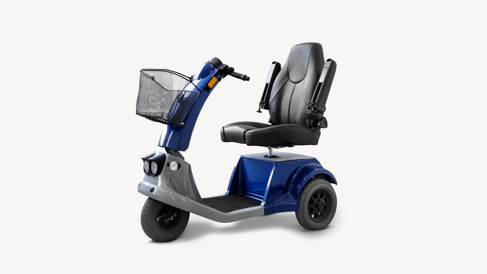Medicare provides essential health coverage for millions of older adults, but many enrollees don’t realize the full scope of benefits available beyond just doctor visits and procedures. Discovering everything your Medicare plan offers can unlock a treasure trove of hidden benefits. These include everything from spending cards, meal programs, and transportation support, to telemedicine, tobacco cessation assistance, and chronic disease management services
Understanding the hidden benefits of Medicare creates opportunities to access resources that can dramatically improve your mobility, independence, and quality of life. One such example is mobility scooters, which can restore freedom of movement if walking becomes difficult. But will Medicare help pay for a mobility scooter if needed?
The Benefits of Mobility Scooters
Mobility devices in general are becoming increasingly common, with nearly 20% of older adults and 23% of survivors reporting using them. Mobility scooter usage, in particular, is poised to grow substantially.
Mobility scooters are essentially motorized chairs on wheels controlled by a steering column. They provide independence to users who have trouble walking unassisted, allowing them to get around comfortably while seated.
For older adults or those with limited mobility, medicare scooters for mobility offer many advantages:
- Restore the ability to independently visit places like shops and parks.
- Reduce the risk of falls compared to using walkers or canes.
- Relieve pain and fatigue from extensive walking.
- Increase social opportunities and reduce isolation.
- Improve access to run errands and appointments.
Having a Medicare scooter prescribed by a doctor can be life-changing. But these devices also involve significant costs.
Does Medicare Cover Mobility Scooters?
The good news is that yes, Original Medicare (Part A and Part B) can provide full or partial coverage for a mobility scooter or power wheelchair if you meet certain conditions. Per Medicare.gov, the requirements include:
- Your doctor must confirm you have a medical condition that severely limits mobility in your home, making a scooter medically necessary.
- You cannot effectively accomplish daily activities even with canes or walkers.
- You can safely operate the scooter on your own or with assistance that is always available.
- The doctor prescribing the scooter must be enrolled in Medicare.
- The equipment supplier must accept Medicare assignment costs.
- Your doctor or supplier has visited your home and verified that you can use the equipment within your home
Both your doctor and equipment supplier must be Medicare-approved, and you’ll need a written prescription from your doctor stating your medical need for the mobility scooter.
If eligible based on these criteria, Medicare Part B will cover 80% of the Medicare-approved cost after you pay the annual deductible. You would be responsible for the remaining 20% coinsurance.
The Process to Get Medicare Coverage
If your doctor determines you meet the eligibility criteria, here is the process to go through.
1. Get examined: Set up an in-person appointment with your Medicare-approved doctor to evaluate your condition and mobility limitations.
2. Obtain prescription: Have your doctor complete a written prescription indicating your medical requirements for a mobility scooter, including the appropriate type.
3. Select equipment: Decide which scooter model best fits your needs, abilities, and home environment. Consider buying vs renting.
4. Find a supplier: Search for Medicare-approved suppliers in your area that accept Medicare assignment for medicare scooters.
5. Confirm coverage: Ask the supplier to submit for prior Medicare authorization to confirm your eligibility.
6. Make arrangements: Schedule delivery and set up service from the supplier after approval.
7. Pay costs: Submit any claims to your supplemental insurance if available. Pay required deductible and coinsurance amounts.
Completing this process typically results in Medicare covering most costs for an eligible standard Medicare scooter to improve mobility and independence.
Medicare Scooter Costs and Coverage Limits
Medicare does place limits on covered scooter styles and costs:
- Coverage for more advanced power chairs requires additional justification for medical need.
- Medicare usually does not pay for mobility scooters outside the patient’s home for travel or leisure purposes.
- The Medicare Advantage plan might cover less and have a higher deductible than Original Medicare.
- Medicare does not pay for a carrier or lift for your scooter, only the equipment.
- Ask your supplier if they are ‘participating’ in Medicare and ‘accept assignment’, which means they won’t charge you an extra cost beyond what Medicare will pay.
- Medicare usually only replaces a scooter once every 5 years. If you rent it, your supplier is responsible for maintenance and repairs (apart from day-to-day maintenance).
At CoverRight, we strive to provide the guidance you need to make informed decisions about your Medicare coverage. Reach out to us today for assistance in finding the Medicare plan that suits your mobility needs.


